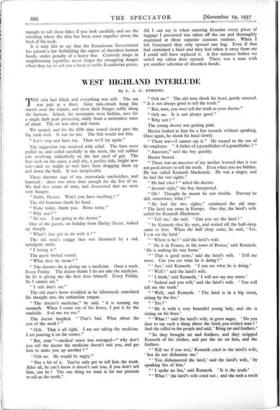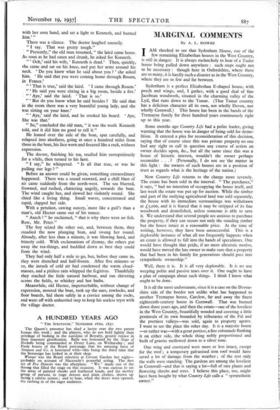WEST HIGHLAND INTERLUDE
By L. A. G. STRONG
THE rain had lifted, and everything was still. The sea was pale as a sheet. Grey rain-clouds hung like shawls over the islands, and drew their fringes softly along the horizon. Inland, the mountains were hidden, save for a single dark peak projecting oddly from a motionless mass of cloud. The air was close and warm.
We turned, and for the fifth time rowed slowly past the big sunk rock. It was no use. The fish would not bite.
" Let's stop and have tea. Then we'll try again."
The suggestion was received with relief. The lines were pulled in, and coiled carefully in the stern, the red rubber eels revolving seductively on the last yard of gut. The best rock on the coast, a dull sky, a perfect tide, bright new eels—and we might as well have been dragging them up and down the bath. It was inexplicable.
Three thermos jugs of tea, marmalade sandwiches, and bannock : there was more than enough for the five of us. We had lost count of time, and discovered that we were very hungry.
" Hullo, Hector. Won't you have anything ? "
The old boatman shook his head.
" None today, thank you. None today."
" Why not ? "
" No use. I am going to the doctor."
One of the guests, on holiday from Harley Street, looked up sharply.
" What's that got to do with it ? "
The old man's craggy face was illumined by a sad, indulgent smile.
" I losing it."
The guest looked round.
" What does he mean ? "
" The doctor—he is giving me a medicine. Once a week. Every Friday. The doctor thinks I do not take the medicine. So he is giving me the first dose himself. Every Friday. So I cannot eat."
" I still don't see."
The old man's brow wrinkled as he laboriously translated his thought into the unfamiliar tongue.
" The doctor's medicine," he said, " it is turning my stomach. When I come out of his house, I put it by the roadside. Aid my tea too."
The doctor laughed. " That's bad. What about the rest of the week ? "
" Och. That is all right. I am not taking the medicine. I am pouiing it on the stones."
" But, man "—medica! sense was outraged—" why don't you tell the doctor the medicine doesn't suit you, and get him to make you up another ? "
Och no. He would be angry."
" Not a bit of it. You've only got to tell him the truth. After all, he can't know it doesn't suit you, if you don't tell him, can he ? The one thing we want is for our patients to tell us the truth.". " Och no." The old man shook his head, gently amused.
" It is not always good to tell the truth."
" But, man, you must tell the truth to your doctor."
" Och no. It is not always good."
" Why not ? "
The young doctor was getting pink.
Hector looked at him for a few seconds without speaking.
Once again, he shook his head slowly.
" There was—I cannot say it." He turned to the son of his employer. " A father of a grandfather of a grandfather ? "
" Ancestor," said the boy quickly.
Hector bowed.
" There was an ancestor of my mother learned that it was not good always to tell the truth. Even when you are bidden.
He was called Kenneth Mackenzie. He was a singer, and he had the two sights."
" He had what ? " asked the doctor.
" Second sight," the boy interpreted.
" Oh ! Thought he meant he saw double. Daresay he did, sometimes, what ? "
" He had the two sights," continued the old man.
" The laird was away in Europe. One day, the laird's wife called for Kenneth Mackenzie.
" Tell me,' she said. Can you see the laird ? '
" So Kenneth shut his eyes, and waited till the half-sleep came to him. When the half sleep came, he said, Yes.
I cm see the laird.'
" ' Where is he ? ' said the laird's wife.
" He is in France, in the town of Rouen,' said Kenneth.
He is making his way home.'
" That is good news,' said the laird's wife. Tell me more. Can you see what he is doing ? '
" Aye,' said Kenneth. I can see what he is doing.'
" Well ? ' said the laird's wife.
" I think,' said Kenneth, I will not say any more.'
" Indeed and you will,' said the laird's wife. You will tell me the truth.'
" Well,' said Kenneth. The laird is in a big room, sitting by the fire.'
yes ?
" He is with a very beautiful young lady, and she is sitting on his knee.'.
" What ! ' said the laird's wife, in great anger. Do you dare to say such a thing about the laird, you wicked man ) ' And she called to the people and said, Bring tar and feathers.'
" So they brought tar and. feathers, and they stripped Kenneth of his clothes, and put the tar on him, and the feathers.
" Kill me if you Kenneth cried to the laird's wife, but do not dishonour me.'
" You dishonoured the laird,' said the laird's wife, by speaking lies of him.'
" I spoke no lies,' said Kenneth. It is the truth.'
" What ! ' the laird's wife cried out ; and she took a torch with her own hand, and set a light to Kenneth, and burned him., )2 There was a silence. The doctor laughed uneasily.
" I say. That was pretty tough."
" Presently," the old man resumed, " the laird came home. As soon as he had eaten and drunk, he asked for Kenneth.
" Och,' said his wife, ' Kenneth is dead.' Then, quickly, she came and sat on his knee, and put her arms around his neck. Do you know what he said about you ? ' she asked him. He said that you were coming home through Rouen, in France.'
" That is true,' said the laird. I came through Rouen.' " He said you were sitting in a big room, beside a fire.'
" Aye,' said the laird. That is so.'
" But do you know what he said besides ? He said that in the room there was a very beautiful young lady, and she was sitting on your knee.'
" Aye,' said the laird, and he stroked his beard. Aye, She was that.'
" So," concluded the old man, " it was the truth Kenneth told, and it did him no good to tell it."
He leaned over the side of the boat, spat carefully, and relapsed into aloofness, going at once a hundred miles from those in the boat, his face worn and fissured like a rock, without expression.
The doctor, finishing his tea, studied him surreptitiously for a while, then turned to his host.
" I say," he whispered. " Is all that true, or was he pulling our legs ? "
Before an answer could be given, something extraordinary happened. There was a sound seaward, and a chill blast of air came suddenly from the north-west. The sea blurred, frowned, and rushed, chattering angrily, towards the boat. The wind caught her, and slewed her violently round. She shied like a living thing. Small waves, concentrated and rapid, slapped her side.
With a petulant, cawing outcry, more like a gull's than a man's, old Hector came out of his trance.
" Aaach ! " he exclaimed, that is why there were no fish. Row, Mr. Peter."
The boy seized the other oar, and, between them, they steadied the now plunging boat, and swung her round. Already, after less than a minute, it was blowing hard, and bitterly cold. With exclamations of dismay, the others put away the tea-things, and huddled down as best they could from the wind.
They had only half a mile to go, but, before they came in, they were drenched and half-frozen. After five minutes or so, the inrush of cold air had condensed the warm cloud- masses, and a pitiless rain whipped the fugitives. Thankfully they reached the little natural harbour, and ran shivering across the fields, to whiskey and hot baths.
Meanwhile, old Hector, imperturbable, without change of expression, moored the boat, took up the oars, rowlocks, and floor boards, hid them safely in a crevice among the rocks, and went off with unhurried step to keep his useless tryst with the village doctor.

















































































































 Previous page
Previous page